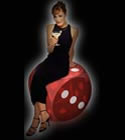Psychology
1. What is meant by “the psychology of poker” ?
Ans : Getting into your opponents’ heads, analyzing how they think, figuring out what they think you think, and even determining what they think you think you think.
2. Suppose on third street that you have a low card up, are in a late position, have a hand of little value, and raise trying to steal the antes. You are reraised by a strong opponent, who was the bring-in and who knows that you automatically would try to steal in this position. What may be the correct play for you ?
Ans : To raise back and then to bet on fourth and fifth streets.
3. Would you make this play against a weak player ?
Ans : No.
4. When an opponent bets in a situation where he is sure that you are going to call, is he bluffing ?
Ans : No.
5. Example ?
Ans : If you have been betting all the way, you bet again after all the cards are out, and a player raises you, he is not bluffing.
6. Do players generally raise as a bluff on fifth or sixth street ?
Ans : No, tough players will raise on these later streets with a mediocre hand that has some potential to become a very strong hand.
7. When might your opponent be bluffing ?
Ans : When thee appears to be a good chance that you will fold.
8. Give an example ?
Ans : Both you and your opponent appear to have four low cards on fourth street but both catch blanks on fifth and sixth streets. If he now bets on the river, and he is the type of player who would try to pick up the pot with nothing, it may be correct to call or raise with a relatively weak hand.
9. In deciding whether to bet, what else is important to consider ?
Ans : What your opponents thinks you have.
10. If your opponent suspects a strong hand, what should you do ?
Ans : Bluff more.
11. Give an example ?
Ans : Suppose you raise on fourth street with two small suited upcards and catch a blank on fifth street. If you check on fifth street but bet again on sixth street when you catch a third small suited card, it is very hard for anyone going high to call with only one pair. So bet your small pairs in this spot.
12. What if your opponent suspects that you are weak ?
Ans : Don’t try to bluff, but bet your fair hands for value.
13. Example ?
Ans : If both you and your opponent checked on sixth street, you frequently can bet one big pair on the end for value, especially if it appears that your opponent is going low.
14. Should you ever intentionally make an incorrect play ?
Ans : Yes.
15. Why ?
Ans : Because you are trying to affect the thinking of your opponents for future hands.
16. Give an example ?
Ans : On third street, you occasionally reraise a late-position player with a small card up, who may be on a steal, when you hold something like a rough three-card eight that does not have straight potential ( especially if your hand is live ).
17. What type of players do these kinds of plays work well against ?
Ans : Players who are good enough to try to take advantage of their new-found knowledge, but who are not good enough to realize that you know this.
Introduction / Starting hands / Three of a Kind Wired / Disguising Your Hand / Ante Stealing / Getting Reraised on a Semi-Steal / When an Ace Raises / When the Bring-In Raises / General Strategy / How Far Do You Go? / Fourth Street / Check-Raising on Fourth and Fifth Streets / Fifth Street / Sixth Street / Seventh Street / Position / Playing the High Hands / Bluffing / Slow-Playing / Knowing Your Opponents / Raising Aggressively / The Toughest Decision of All / Staying to the End / Pairing the Door Card / Keeping Track of the Cards / Scare Cards / An Expert Play / Another Good Play / Reading Hands / Psychology / Afterthought


